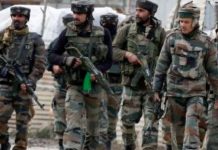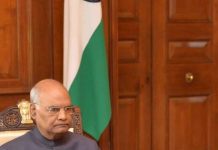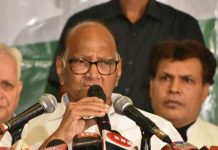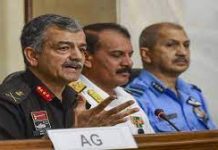Lashkar-e-Taiba chief Hafiz Saeed has a strategy and an army full of faithfuls. Harinder Baweja tracks the 26/11 mastermind

Photo: Reuters
At first sight, he easily passes off as a cleric, a scholarly-looking man, a pious elder seldom seen without a walking stick in his hand and a cap on his head. He is a familiar face on Pakistani television screens, but were it not for his acerbic tongue, few would pause to look at him a second time. His is not a face that draws attention, but his views do. Each time this ‘pious’ man addresses a congregation, he can hold a crowd of one lakh spellbound. The powerful orator is clear-headed about his interpretation of the Koran and believes that killing is “every pious man’s obligation” and the destruction of non-islamic forces a duty assigned by allah, the almighty.
The closest an Indian journalist can currently get to this very pious professor, Hafiz Saeed, the Amir of the Lashkar-e- Taiba (LeT), India’s most wanted man are his lawyer, AK Dogar and his son-in-law, Khalid Waleed. Speak to the lawyer and the conversation goes something like this:
You’re representing a man the Indian government thinks is the mastermind of 26/11.
If Karl Marx is the mastermind of all socialists, then Hafiz Saeed is a mastermind. He is a masterly religious scholar who runs 140 schools all over Pakistan.
But Hafiz Saeed openly calls for jihad.
I have read books about Mahatma Gandhi…
Are you comparing Hafiz Saeed to the Mahatma?
I can’t dare to do that. Muslims have a different point of view. We don’t go by Jesus Christ’s principle of turning the other cheek.
Hafiz Saeed is well known as the founder of the Lashkar-e-Taiba, which was behind the Mumbai attacks…
The Indian government has not a shred of evidence, no tangible proof that Hafiz Saeed was in any way connected to the Mumbai attacks. Jihad is a word that means struggle, even if it done through monetary assistance and charity work. All over the world, there is a feeling that Muslims are terrorists…
Lets talk specifics. Ajmal Kasab, the lone terrorist captured alive has testified to the role of your client.
[box]
MUMBAI CONNECTION
1 Kasab first meets Saeed in December 2007 at Muridke during preliminary training
2 Kasab meets Saeed again during advanced training in Muzaffarabad, Pakistan Occupied Kashmir
3 Kasab trained to use sophisticated arms and GPS navigation aids over eight weeks by a man referred to as ‘Major General’
4 Saeed personally chooses the ten 26/11 attackers. Gives Kasab the codename Abu Mujahid
5 Kasab and other 26/11 attackers given sea training. Saeed questions team about training given
6 Saeed tells Kasab and other attackers that Mumbai is their target. Along with the ‘Major General’, conducts final test
7 Saeed divides group of ten attackers into pairs. Kasab and teammates are given detailed orders about routes and attack plans
8 Saeed tells Kasab that foreign tourists must be targeted and killed, to embarrass India
9 Saeed orders the final attack
[/box]
My dear lady, such evidence will not even be admissible in an Indian court of law. Any statement made by an accused is not credible evidence…

Photo: AP
Waleed, the son-in-law, is not as glib, perhaps because of his close proximity to the pious professor, the Amir of the Lashkar, also known as the Army of Allah. Waleed admits, now, as he did a few months back when he escorted me through the sprawling Muridke complex just off Lahore — known worldwide as the headquarters of the Lashkar-e-Taiba — that the Amir’s message to this Army of Allah on the issue of Kashmir, at least, is very clear: they don’t respect the Line of Control, they are working towards the accession of Kashmir to Pakistan and for that they actively help the LeT with propaganda, money and arms.
But ask Waleed about Hafiz Saeed’s link to 26/11 and he is quick to dismiss it as ‘Indian propaganda.’ He refers to the 60-year-old Saeed as ‘bazurg’ (an older man) and in chaste Punjabi says, “Bazurgan nu badnaam kita hai India ne (India is besmirching the reputation of the old man. The Indian Home Minister asking for Saeed saab to be investigated and sent to Mumbai for trial is like Pakistan asking that Narendra Modi be brought here because he masterminded the killings of so many Muslims in Gujarat.”
ANY THAW in India-Pakistan relations, which went into deep freeze after 26/11, now hinges on the progress India expects its neighbour to make on the terror investigation. Hafiz Saeed lies at its core. Home Minister P Chidambaram and his counterpart in South Block, Minister for External Affairs SM Krishna have been vociferous in demanding that Hafiz Saeed be interrogated and prosecuted on the basis of what National Security Advisor MK Narayanan calls, “Grade One evidence.’’
Chidambaram, in fact, is leading the campaign against Hafiz Saeed and believes the government has shared enough information — through six dossiers — with Pakistan. What exactly is the government’s case against Saeed and what details do the dossiers contain?

Photo: AP
A lot of the ‘credible evidence’ has been garnered by senior officers of the Intelligence Bureau (IB) and the Research and Analysis Wing (RAW) through elaborate and detailed hours-long conversations with Ajmal Kasab. Kasab, who opened fire at Chhatrapati Shivaji Stadium and then at Cama Hospital, was subsequently also responsible for killing former ATS Chief Hemant Karkare and his colleagues Kamte and Vijay Salaskar before the Mumbai Police overpowered him. What IB, RAW and the Mumbai Police have been able to piece together is the back-end story of the planning and training that went on for a whole year prior to the attacks on 26/11. According to Kasab, Hafiz Saeed masterminded the entire conspiracy and paid individual attention to the finest detail, choosing the ten who eventually landed at Badhwar Park, overseeing their target practice, dividing them into pairs and overseeing the hijacking of an Indian trawler, the MV Kuber.
In the dossiers, Kasab implicates Saeed with specific details of time and location:
• Kasab first met Saeed at Muridke during the course of the 21-day Daurae- Sufa (preliminary training) between December 2007 and January 2008, where a batch of thirty recruits was explained the meaning of jihad. The batch was introduced to Hafiz Saeed and the operation commander Zakiur- Rahman. Saeed addressed the batch: “You mujahideen have to fight to liberate Kashmir,’’ and Lakhvi said, “Ab jihad ka waqt aa gaya hai (the time for jihad has come). Our group has been fighting in Kashmir for the last fifteen years, but Hindustan is not freeing Kashmir. We now have to wage a war to get Kashmir. Are all of you ready for this battle? We are planning to target big cities to weaken India.”
‘If Karl Marx is the mastermind of all the world’s socialists, then Hafiz Saeed, too, is a mastermind,’ says his lawyer, AK Dogar
• The batch was then inducted for the Daura-e-Khas (advanced training) at a fortified Lashkar camp in Muzaffarabad, where Kasab and the others were trained to use Kalashnikovs, rocket launchers, pistols and grenades. They were also familiarised with the use of GPS navigation devices and map-reading and were given survival training – how to stay hungry and how to climb mountains while carrying heavy backpacks. During the course of this training, an unknown man was also present. At that time, Hafiz Saeed and Lakhvi came there and met and hugged the unknown man, who was referred to from then on as ‘Major General’. The Major General supervised the eight-week long training during which Kasab says they were converted into ‘pucca jihadis’.
• Kasab and others then met Hafiz Saeed at the Beit-ul-Mujahideen (Home of the Mujahideen) camp, where they were shown CDs of fidayeen attacks in Kashmir.
Chidambaram wants Pakistan to do more: investigate locations pinpointed by Kasab, examine LeT operatives’ call records
• According to the dossier, Kasab also revealed that it was Hafiz Saeed who chose the final ten who were sent via sea to Mumbai. Saeed also personally gave them new names. Ajmal Kasab was named Abu Mujahid. Imran Babar from Multan, for example, was named Abu Akash.
• The group then came back to Muridke for Daura-e-Ribat (intelligence training) in August 2008. The Major General visited the group again to motivate them and asked Kasab if he knew how to swim. The senior army officer then told Kafa, the course commander, that the group was now ready for sea training (“ab inko samundari training do’’)
• In September 2008, the group was taken to Karachi by train and kept at a house in Ajizabad locality. After two days, they were taken out to sea in two boats and then transferred onto a motorboat for three days during which they were trained in how to use GPS devices at sea. They were taught how to use fishing nets “so they could pass for fishermen in case they were questioned by the Indian Navy.”
Hafiz Saeed took credit for the deadly attack on Delhi’s Red Fort in December 2000. He still calls for jihad against India
• On their return, they were taken to the Beit-ul-Mujahideen camp where Hafiz Saeed and Lakhvi personally questioned them about their sea training. Here, they were also introduced to three other mujahideen. Saeed told them, “They are also fidayeen like you and have been similarly trained. They will be accompanying you to India for the attack.’’ He also said, “Ab jihad ka waqt aa gaya hai’’ and Lakhvi told them that they had decided that Mumbai would be the target and that they would be going to Mumbai via sea. The Major General came to this camp and after hugging Saeed and Lakhvi, took them aside for a private chat. When the trio returned to where Kasab and the others were assembled, Lakhvi said that the Major General wanted to test their preparedness. According to the dossier, Kasab and the group were given a Kalashnikov and a magazine each and the Major General told Hafiz Saeed, “Saeed saab, aap target lagao.” Saeed told Kafa (the course commander) to place ten targets and told Kasab and his nine companions, “When I say fire, all of you should fire single shots and when I say fire twice, open rapid fire.” As per the cue, all ten of them opened fire and hit the target, except for Imran Babar, who was reprimanded by Hafiz Saeed. When the Major General said “fire” twice, the mujahideen opened rapid fire. The Major General wanted to know who had fired at target number four. Kasab, apparently, earned praise from both the Major General and Hafiz Saeed.

• The group was then introduced to Zarar Shah, the computer and media expert. Soon after, Hafiz Saeed broke the group of ten up into five pairs and said, “We now have to hijack an Indian boat to go from Karachi to Mumbai. A lot of foreign tourists come there and they have to be targeted and killed to embarrass Hindustan.”
• Hafiz Saeed, Lakhvi and Zarar Shah then took the group to a big hall which Zarar Shah called ‘the media room.’’ Here, they were shown CDs of CST train station and Malabar Hill. The CDs also contained detailed information of which roads and routes to take to CST from Badhwar Park. This was shown to them on Google Earth.
Saeed is an improvised explosive device in the hands of his mentors. His hatred for India stems from religious and personal reasons
• They then returned to the Bait-ul- Mujahideen camp. There, they were asked to shave their beards. Mobile phones with Indian SIM cards and watches set to Indian time were given to them and they were also asked to tie a red thread around their wrists, so as to pass off as Hindus. The group was ready to set sail for Mumbai and were given identity cards with Indian names. Kasab was dubbed Sameer Chaudhary and given a Bengaluru identity card with Arunoday Degree College written on it.

Photo: AFP
All of this could well be rejected as a confession forced out of Kasab through third degree torture. Pakistan has been dismissing the dossiers saying they only contain information and not evidence. India, however, believes that if serious, Pakistan’s investigative agencies can visit the places named by Kasab. Chidambaram has been asking for more. He says Lakhvi and Saeed’s phone records should be analysed. The sixth dossier — which contains the most information against Saeed — notes: “Pakistan cannot continue to remain in a state of denial over the involvement of Hafiz Saeed. Evidence on record together with the evidence that may be gathered in the course of investigations would — and should — certainly lead to the prosecution of Saeed.”
SINCE PAKISTAN is repeatedly rejecting the Indian government’s request, the question that gains relevance is this: Why is Pakistan reluctant to move against Hafiz Saeed? Pakistan was quick to investigate and arrest both Lakhvi and Zarar Shah. Why not the ‘pious’ professor himself? Saeed, after all, has given open calls for jihad against India and, after it happened, personally took credit for the attack on the Red Fort in Delhi in December 2000.
Hafiz Saeed, according to Pakistan’s own strategic experts, is not just a plain terrorist, but also an asset in the hands of the establishment. Unlike a Baitullah Mehsud — the Taliban leader who was recently slain by a Predator drone missile — Saeed neither runs riot within Pakistan nor trains his guns on his mentors within the Army and the ISI. Says Lt Gen Hamid Gul, former ISI Chief, “Why doesn’t India address the issue of Kashmir? People like Hafiz Saeed will remain important till then. The bull will keep charging as long as the red rag is there.”
Saeed is placed under ‘house arrest’ for western consumption. The recent FIRs against him have nothing to do with 26/11

Photo: AP
Gul is not Saeed’s only supporter. He is just one among many officers from the ISI and the Pakistani army — serving and retired — who is a vocal supporter of the Lashkar-e-Taiba. This is endorsed by Ahmed Rashid, well-known journalist and author: “Retired ISI officers are helping the jihadis and have become more Lashkar than the Lashkar,” he says. The core reason why Hafiz Saeed and his fighters have deep linkages and continuing support from the establishment is linked to the battle Pakistan is being forced to fight on its western border. He comes in handy for Pakistan to be able to raise the Kashmir card with the US. As Rashid points out, “Musharraf used to put Hafiz Saeed under house arrest for Western consumption, but little was done to curtail the LeT’s activities within Pakistan. They continue to recruit and train people.” The Lashkar is estimated to have 1,000 offices across Pakistan and Hafeez Saeed’s army now hides under the alias of the Jamaat-ud-Dawa. Kasab’s arrest is proof of the fact that ‘non-state actors’ can use Pakistani soil for terror activities, particularly if they are aimed at India.
In India, the US ambassador is politically correct. Timothy Roemer has endorsed the dossiers, saying there is a lot of proof in them. However, the reason why the US is not pushing the case with the Pakistan government is simply because Washington needs the Pakistani Army to fight its global war against terror. Perhaps this is the reason why Pakistan continues to be able to stall the FBI from investivating 26/11 leads. Hamid Gul puts it bluntly: “India has made the childish mistake of hanging the 26/11 case on one man (Hafiz Saeed) and it is now making a second mistake by trying to push the case through the Americans. They are losing the war in Afghanistan and frankly, the US needs Pakistan more than it needs India.”

This need keeps Hafiz Saeed in business. He, in fact, is an armed improvised explosive device in the hands of his mentors. His hatred for India — also openly echoed by his son-in-law during our tour of Muridke — stems from reasons personal and religious. His ‘cause’ for revenge is linked to his past — thirty of his family were murdered during Partition when his father, an ordinary landlord, moved from Simla to Pakistani Punjab’s Mianwali district. Saeed himself is a father of two – a son and a daughter.
He grew up on the Koran and pursued religious studies in Saudi Arabia, from where he got a Masters in Islamic studies. The professor, who speaks only Urdu and chaste Punjabi, taught Islamic Studies at the University of Engineering and Technology in Lahore. Like many in Pakistan, Saeed too participated in the US-sponsored jihad against the Russians in Pakistan. He now asks a difficult question when he appears on television screens in Pakistan: “If we were not terrorists at that time, then why are we terrorists now?’ Saeed is quick to answer his own question and the answer invariably is, “Allah has ordained every Muslim to fight until His rule is established. We have no option but to follow Allah’s order. The blow struck by jihad does not come from man, it comes from Allah.”
Ajmal Kasab was motivated enough, to follow Hafiz Saeed’s orders. Perhaps more are being indoctrinated, even as India continues to build the pressure on Pakistan to investigate the man who figures as number one on the list of the 35 people ‘most wanted’ for 26/11. The Pakistani Establishment, however, continues to shield him. Typical of the schizophrenic manner in which Pakistan operates, the Professor continues to be a free man despite Prime Minister Yousuf Raza Gilani’s recent assertion that he had been placed under house arrest. The PM, in fact, was contradicted by an Inspector General of Police, who vowed that Saeed was a free bird.
In the last two months alone, he has given two sermons condemning India and the US, accusing both of masterminding 9/11 and 26/11. Two FIRs have now been lodged against him but neither have anything to do with the Mumbai attacks. On both these occasions, Saeed reiterated that “the time has come to stand united and come forward to take part in the jihad.” His defence no doubt will be that he has not called for an armed jehad but a spiritual one. The pious Professor has an agenda and he is, clearly, still at work.
WRITER’S EMAIL
shammy@tehelka.com











